IWMW16 – Higher Ed web managers conference write up
The University had a fantastic level of representation at this year’s IWMW conference hosted at Liverpool JMU in late June. In this post, colleagues share their thoughts on the event.
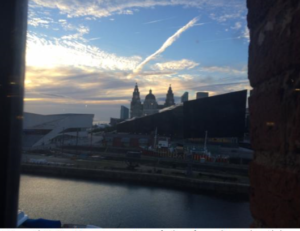
The Merseyside Maritime Museum was a great venue for the conference dinner and provided some spectacular views over the city
This year saw members of our team joined by colleagues from Edinburgh College of Art, the Law School and the Arts Humanities and Social Sciences College web team at the IWMW conference. We attend this get together of UK higher education web professionals most years, and contribute talks and workshops whenever we can.
In this post we share thoughts on the conference from:
- David Oulton (AHSS College web team)
- John Lockhard (School of Law web team)
- Bruce Darby
- Rachel Bhandari
- Neil Allison
David Oulton – College of AHSS Web Team
Why did you decide to attend the conference?
I’d attended the IWMW conference last year, and what attracted me this year was the session on the myths of external WordPress hosting, as it’s increasingly a part of my daily work.
I’d done a little research into this area before, and the advantages of local infrastructure and support usually won out, but the scales seem to be slowly shifting, so it was interesting to see what advances there had been is this type of service. There’s a lot of hard-won knowledge in our team on the best solutions for security, modules, plugins and which solution to apply in a particular context, but sometimes the thought of a managed solution with 24-hour expertise available is very tempting. It would free us up to work more closely with researchers and devote more time to the the increasing amount of research project sites. The option of local datacenters also removes some of the previous concerns about data security – no Safe Harbour worries, although what happens with the 2018 EC Digital Single Market directives post-referendum remains to be seen (pun not intended). I’m still looking for the USP that would tip me towards advocating it, but not having to do plugin updates is almost reason enough…
What was the best presentation or session?
I think the most surprising/worrying/interesting [delete as applicable] part of the 2016 IWMW conference was the final panel (the ‘jazz’ session) hosted by Mike McConnell. He asked a question along the lines of ‘Do you think the traditional university CMS will exist five years from now?’ And the show of hands seemed to indicate (by a roughly Brexitty margin) that the delegates thought not.
With the proliferation of ‘as a Service’ platforms (software, platform, infrastructure) and the move towards ‘everything mobile’, is the future of a University website one where a small business-critical core site is fed by a host of devolved platforms? The advent of complete online degrees managed by third-party providers is very close, and external services are already an increasing part of the University’s digital footprint.
Could this extend to web developers working more closely with external providers? Will HE institutions give a set of requirements – ‘Here’s our logos, design brief, house style guide – customise your app, plug it into our site’?
What was the big trend or takeaway point you took from the conference?
The takeaway lesson from this year’s IWMW – digitally, as well as politically, it looks like we are about to ‘live in interesting times’.
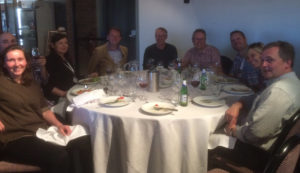
Some of the University of Edinburgh contingent enjoying the conference dinner together with colleagues from other universities
John Lockhart – School of Law Web Team
Why did you decide to attend the conference?
I was made aware of the IWMW conference in previous years, but this was my first time attending the conference. As a web manager, I welcomed the opportunity to hear from and engage with other institutional web managers.
What was the best presentation or session?
As sometimes happens, the best session was on a subject I didn’t expect to be as interested in.
Marianne Kay discussed Digital Governance in the Higher Education institution. The session covered a wide range of issues, but one in particular stood out for me.
Processes are vital to the understanding of what is happening to content. With my colleagues, we assign and direct processes to content managers and content editors, understanding the process of information update. But it is broader than that. In some cases, it is vital that we have a “golden copy” of data, which although it may be reused in other webpages, it must be distinct.
The process of how this content is updated is critical. At its simplest level, it comes down to:
- Who is providing, and when are they expected to provide the vital content?
- Who is updating, and when are they expected to update the vital content?
This sounds tedious, and no doubt is for those who have to do it. Sadly, information on an institutional webpage could potentially be breaking consumer law, and therefore the above process becomes critical to an institution.
What was the big trend or takeaway point you took from the conference?
It would be wrong to call it a trend, but Usability (UX) and Analytics make another obvious appearance at a conference. Each time, it emphasizes the importance of taking the time these processes deserve to develop both strategies in taking websites forward.
Bruce Darby
Why did you decide to attend the conference?
Although the main reason was the fact that I was delivering a workshop on the dilemmas our team faced during the migration from Polopoly to EdWeb it was also very much to reconnect with the web management community. I’d missed the previous year having been in 2014. It’s a great conference that balances the informal, friendly atmosphere with a formal work setting delivering interesting, thought provoking, honest and professional workshops and presentations.
What was the best presentation or session?
For me this was ‘Building a New University Website – an Agile Content Case Study’ by Rich Prowse from the University of Bath which looked at refreshing the content of a website rather than just the design. It was an honest appraisal of where they are at and how they recognise a site needs constant improvement and maintenance rather than a series of discreet one-off projects. They use a different agile project methodology to us of DSDM (Dynamic Systems Development Method) which I’d like to look at to see if we can learn anything from this.
What was the big trend or takeaway point you took from the conference?
That teams need to change and be flexible depending on the tasks they are facing. Sounds obvious but it isn’t something we tend to do as a matter of course.
The other thing that was mentioned a few times was Kotter’s 8 step process for leading change. The first step is to create a sense of urgency. This can also be created for you if decisions are made that effect your work but are essentially out of your control! It means that some people use this uncertainty or difficult time to create a driving force for change to turn what could be a negative situation into a positive one.
Rachel Bhandari
This year’s IWMW conference was my second time attending the conference and my first as a presenter.
There was an extra air of celebration in the air this year as this year’s event was the IWMWs twentieth anniversary. That combined with a great location – who knew Liverpool would be sunny? – excellent conference and evening venues and great conference content made it a thoroughly useful and enjoyable experience.
You can always get a great overview of the conference from the IWMW blog so no need for that here but the key takeaways for me around interpreting what organisational change really means in a practical sense.
Dealing with the challenge of change while practically achieving something
Unsurprisingly, given the theme of the conference, we heard a lot from folk who were struggling within an atmosphere of change or trying to effect change within the organisation to enable them to work more effectively. Examples like the University of Greenwich where the new web team had to fight against the culture of the institution to champion an approach where the needs of the users were put before a reactive approach to the loudest voices in the University.
Change can be different things in different contexts
Rob van Tol from Precedent’s session gave us a chance to think about this by giving a wide range of different examples from ten of their digital projects of how clients had delivered change at varying levels and at various scales within their organisations. http://www.slideshare.net/Precedent/iwmw16-precedent-plenary-talk-from-rob-van-tol-managing-change-leading-horses-to-water
Using Agile as a catalyst for change
As ever it was interesting to hear from the University of Bath where Rich Prowse gave a case study presentation of how they are taking an Agile content approach to building their new website. The importance of really committing to an Agile mindset over and above just Agile techniques was well illustrated and how it can’t be a panacea for the organisational change that also goes along with its successful implementation.
My experiences of IWMW 2016
Finally, to chip in my thoughts…
Like Bruce and Rachel, I attended both to learn and to contribute. This was my 5th time at the conference, and I keep coming back because I like the relaxed atmosphere, the sharing and honesty among delegates, and the occasional nugget of insight into another institution’s practices that challenges my own thinking.
This year, I gave the opening plenary presentation, as well as contributing a masterclass on usability testing.
Slides and video from my talk – Requirements are hypotheses
This year, my highlight was hearing from Rich Prowse at the University of Bath, as he updated us on how the overhaul of his university’s website was progressing using agile content approaches. An honourable mention also to Gareth Saunders at St Andrews who provided an often humorous story of his 10 years in the web team there.
Rich Prowse’s agile content case study – slides and video
More write ups of the conference
The IWMW conference has a social site on Lanyrd, containing write ups, slide decks and other materials contributed by attendees.
IWMW 2016 Lanyrd site – contributions from conference attendees
Videos and slide decks
All plenary sessions were webcast and recorded this year.


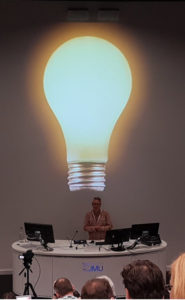
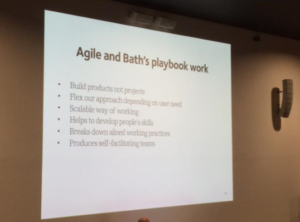
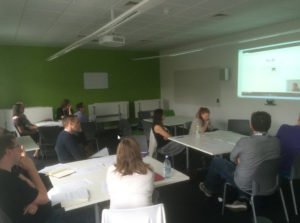
1 replies to “IWMW16 – Higher Ed web managers conference write up”